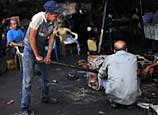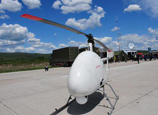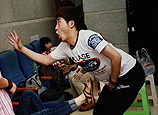
When Dongda village authorities, in the Chang'an district of Xi'an, Shaanxi Province, decided to construct a 600,000 yuan ($97,740) mausoleum and grounds honoring Zhang Lingfu, a general famed for his exploits during the War of Resistance against Japanese Aggression (1937-45), they were unprepared for the controversy that would erupt over their decision.
Zhang Lingfu was a loyal soldier - but not to the Communist Party of China (CPC). He was a member of the Kuomintang (KMT), who fought against the CPC in the War of Liberation (1945-49). If this, combined with the expense of the mausoleum, wasn't enough to stir controversy, Zhang's checkered past as a man who murdered his wife certainly was.
Within days of the controversy exploding in the public eye, local authorities quietly renamed the mausoleum "Dongda Village Cemetery."
"The change was made under pressure. Some bad people used the identity of the general to turn this into a political issue and even attack the Communist Party of China (CPC)," Liu Jianli, the head of the village, told the Global Times Wednesday.
The dead stir
Before Zhang Lingfu was a war hero, he was a man who had only escaped the death penalty due to health reasons - his murder of his wife had shocked the country. He was imprisoned, and later freed when the KMT released prisoners with military backgrounds to serve in the fight against Japanese invaders.
Zhang participated in almost all the important battles against the Japanese and had great successes in many of them. Though he was permanently injured in one leg from a bullet wound, he insisted on staying on the front lines.
Known as the "invincible general," his fame was said to terrify Japanese soldiers. In 1946, he was appointed head of the 74th division, a key KMT army.
Zhang was shot dead during the Menglianggu Battle during the civil war in Shandong Province in May 1947. History textbooks regard it as a turning point in the war in East China, marking the downfall of the 74th division.
According to Liu, Zhang's descendents fetched earth from Menglianggu and buried it in the tomb, marking its opening in 2010.
"All the villagers agreed to build the mausoleum for Zhang to carry on his patriotic spirit and show him respect," Liu claimed. "A smaller reason was to boost local tourism and the economy through the general's fame."
Liu pointed out that Zhang's tomb had only cost about 20,000 yuan, with other tombs, facilities and a hall to store those who have been cremated comprising most of the 600,000 yuan.
In recent years, about 4,000 villagers' tombs were removed near Zhang's tomb to provide land to expand a university, Liu said.
"We keep the general's tomb standing in the first row," he added.
The Global Times was unable to reach Liu for further enquiries as to how the local villagers came to a consensus on building the cemetery.
Lei Wenmin, an official from the civil affairs bureau of Chang'an district administrating the village said that he couldn't find any record of the cemetery being established. Lei and other local officials said that the cemetery was violating local regulations and illegally occupying land.
However, when the cemetery was under construction, local authorities didn't object or stop construction, an insider from the village committee told the Legal Weekly.
On May 27, Lei ordered local law enforcement to conduct an investigation.
Divided by deceased
Zhang Ye, a 75-year-old retired teacher in Dongda village, has known Zhang Lingfu's story since he was a child. Despite being familiar with the story, he believes the leaders "made a big political mistake."
"We can't build a luxurious cemetery for a senior KMT general who was shot dead," Zhang Ye told the Legal Weekly.
Some within the government echo this view. An employee of the district's civil affairs bureau said that Zhang was a KMT general but not a CPC martyr, so he doesn't deserve his own cemetery, the newspaper reported.
However, Zhang Lingfu has his supporters. "Zhang made a great contribution to the whole nation. There's nothing wrong with building a cemetery for him," said Zhou Xueying, a history professor with Nanjing University.
"In today's peaceful environment, we should abandon the ideological differences between the KMT and the CPC and respect history," Zhou said. "Civil wars are like fights between brothers. When the fights are finished, the brothers are still brothers."
Better late than never
During the War of Resistance against Japanese Aggression, about 3.21 million KMT soldiers died for the nation, according to china.com.cn.
However, for many years, the textbooks focused on the KMT's inertia when fighting against Japanese invaders.
KMT soldiers, who fought against the CPC in the years between 1945 and 1949, were often criticized as having "the blood of the people" on their hands, according to Sun Chunlong, a founder of Laobing Huijia (veterans come home), an NGO that aims to bring recognition to KMT soldiers who fought the Japanese invaders.
"We should provide more care for KMT soldiers who once fought against Japanese invaders. It would be good for the cooperation across the Taiwan Straits," Sun said, citing efforts to respect the dead on both sides of the US civil war as an example.
Some KMT members who died in the War of Resistance against Japanese Aggression have been recognized and rewarded by the People's Republic of China, according to Xinhua. The Guoshang Cemetery, which was established in 1944 for more than 9,000 KMT soldiers in Tengchong county, Yunnan Province, was listed as a national-level patriotic education center in 1997.
Good news came for Zhang's family in 2005, on the 60th anniversary of victory in the War of Resistance against Japanese Aggression, when Zhang Juli, Zhang Lingfu's first son, along with other KMT veterans, received medals from the Central Committee of the CPC.
"Contributions by the KMT in the War of Resistance against Japanese Aggression were previously downplayed, because of a period in history. People should not worsen the scars of history, but instead improve solidarity among Chinese people," said Qu Xiaoyuan, a history professor with Northeast Normal University.
















 White-collar workers setting up stalls become popular
White-collar workers setting up stalls become popular


![]()
